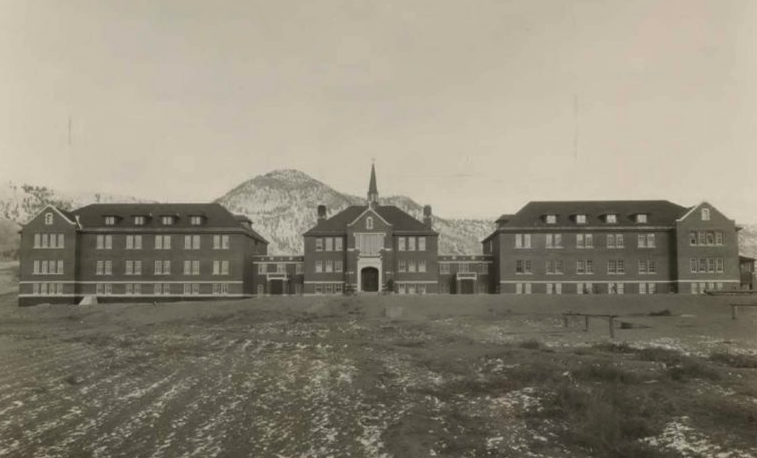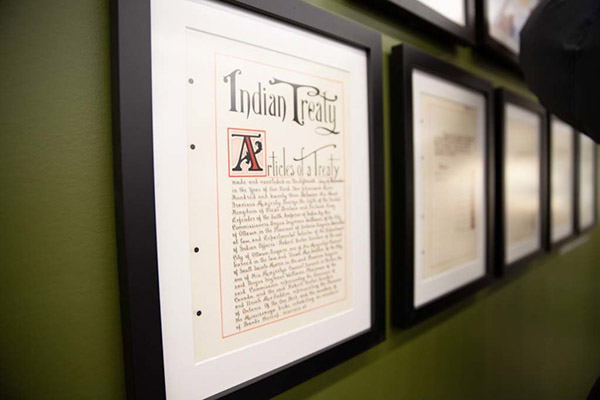September 30, National Day for Truth and Reconciliation, acknowledges the lasting, intergenerational impact of residential schools, while honouring the process of reconciliation. It is intended as a day for education and reflection.
National Day for Truth and Reconciliation grew from Orange Shirt Day - a grass-roots movement and a legacy of the St. Joseph Mission residential school commemoration event held in Williams Lake, BC, in the spring of 2013. It was sparked by the account of a young girl, Phyllis, having her new orange shirt taken away on her first day of school at the Mission. On September 30, we wear orange to remember the experiences of the children taken to residential schools.
For almost 60 years, Trent has been a leader in Indigenous education and incorporating Indigenous teachings and perspectives into curricular and extra-curricular programming. We are committed to providing education in Indigenous history, traditions, cultures, and Indigenous knowledges for our students and broader community. To advance the goals of National Day for Truth & Reconciliation Day, we have pulled together a variety of resources to assist members of the Trent community to learn, reflect, and take action to advance reconciliation.

Campus events and observations
Monday, September 29, 2025
- 10:00 a.m. - 3:00 p.m. Information table on Bata Podium
- 1:00 p.m. - 2:00 p.m. Truth in Every Step: Honouring Indigenous Voices relfective walk at LEC Drumlin
Tuesday, September 30, 2025
Peterborough
- 6:30 a.m. Sunrise Ceremony, Champlain College Fire Pit
- 9:30 a.m. Campus Ceremony and moment of silence, Champlain College Fire Pit
- 10:00 a.m. - 3:00 p.m. Information table on Bata Podium
- 10:00 a.m. - 12:00 noon Bridge Chalking, Stephenson/LEC Bridge
- 12:00 noon Three Sisters Lunch, Gzowski College Quad while supplies last
- 1:00 p.m. - 3:00 p.m. Rock painting and reflection, Lady Eaton College Quad
Durham
- 11:00 a.m. Campus Ceremony, Medicine Garden*
- 11:30 a.m. Three Sisters Lunch, A121 while supplies last
- 11:30 a.m. Lecture with Jason Carter (Bear Standing Tall) - A121
- 12:30 p.m. Community activities: beading, orange shirt and rock painting activities- Medicine Garden*
*weather permitting, alternate location Building A Atrium
In the days before the National Day for Truth and Reconciliation, the Trent Durham community is invited to take part in initiatives across campus designed to foster reflection and dialogue. Join in creating a collective banner of care and support in recognition of Truth and Reconciliation. This collaborative project offers a space for reflection, learning, and visible commitment as we continue the journey toward reconciliation. During this event, screenings of the Williams Treaty films will be hosted on displays across campus, offering important insight into local histories and the ongoing legacies of treaties in the region and displays will be set up to share resources about the meaning of the National Day for Truth and Reconciliation, as well as practical steps everyone can take to support reconciliation efforts in their daily lives.
- Tuesday, September 23rd: 12pm to 1:30pm in the Plaza Lounge
- Tuesday, September 23rd: 2pm to 3:30pm in the Library Atrium
- Wednesday, September 24th: 11:30am to 2:30pm in the Library Atrium
- Thursday, September 25th: 10am to 12pm in the Library Atrium
Trent Educational Resources
- Review the lesson plans created by the Trent School of Education to teach about residential schools.
- Read the Centre for Teaching & Learning's special issue of Teaching Notes for National Day for Truth and Reconciliation.
Trent Statement of Solidarity

Canada has designated September 30 as a National Day for Truth and Reconciliation. This is a day for everyone to reflect on the history between First Nations, Inuit and Métis peoples and settler Canadians and to further our understanding of the injustices of the last centuries. We are asked to make space for and understand the truth of Indigenous Peoples experiences. We are asked to contemplate our own individual role in changing Canada and our communities into places of dignity and respect for Indigenous Peoples.
On this day, as an educational institution, we acknowledge the legacy of residential and day schools and the devastating impact they have had on Indigenous Peoples, their cultures, communities and families. We acknowledge and honour those who survived and who have worked hard to ensure that these actions never happen again. We mourn those who lost their lives in these places.
We use this day to recommit ourselves to a different future, to educating new generations of young people as future leaders of reconciliation. We use this day to recommit ourselves to assisting in the resurgence of Indigenous cultures, languages, traditions, knowledge and thought. We commit ourselves to building the world Chanie Wenjack was running towards.
Additional resources to learn and reflect
- Read the Truth and Reconciliation Commission Reports – both the Calls to Action and the testimony of residential school survivors.
- Review the National Centre for Truth and Reconciliation Archives and Collections.
- Read about residential schools and their profound intergenerational impact, both before 1939 and to 2000.
- Learn about the lands on which Trent is situated by viewing the Treaty Display located at the entrance of Bata Library in Peterborough and the Atrium at the Trent University Durham campus.
- Learn about Indigenous artists through the Gzowski College self-guided Anishinaabe Art Tour in Enwayaang (brochure in the College Office).
- Watch documentaries sharing stories and first-hand experiences of residential school survivors.
- Learn about Manoomin and its importance to the local First Nations.
- Watch Waniska, an awakening of Indigenous Knowledge, and learn from Elders and residential school survivors of the importance of Indigenous Knowledge.
- Read and learn from the United Nations Declaration on the rights of Indigenous Peoples.
- Learn about the history of the relationship between Indigenous people and Canada.
Take action to support Indigenous communities
To support Indigenous communities and the principles of reconciliation, on the National Day of Truth and Reconciliation the Trent community is encouraged to take action and engage meaningfully in reconciliation:
- Offer gratitude through a land acknowledgment.
- Become knowledgeable about the local Michi Saagiig First Nations and their protocols.
- Watch and learn from Elders the importance of building relationships with Indigenous People and the protocol of tobacco offerings as gift giving for knowledge sharing.
- Learn about the lands on which Trent is situated on.
- Support Indigenous businesses, authors and artists.
- Share calls to action with your whole family utilizing the First Nations Child & Family Caring Society of Canada’s Guide to the Truth and Reconciliation Commission.
- Trent community is encouraged to visit and read books, and resources gathered by Trent Bata Library.
